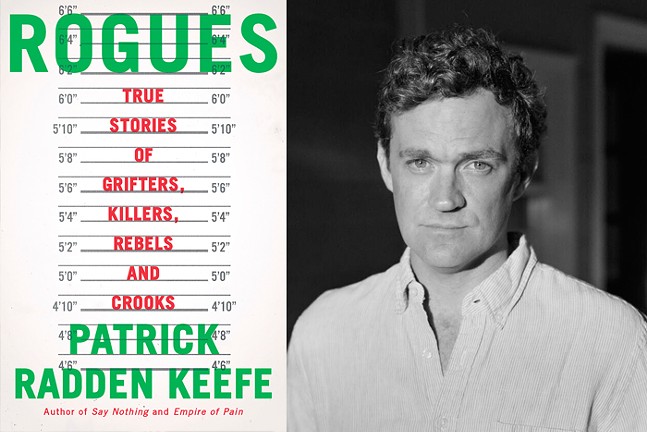In 2016, Patrick Radden Keefe spent time with Anthony Bourdain, following the famed chef and documentarian to Vietnam, getting to know the late author of Kitchen Confidential in a way that transcended most ordinary interviews.
The resulting profile was published in the New Yorker in 2017 and recently reprinted in Rogues: True Stories of Grifters, Killers, Rebels and Crooks (Doubleday). Keefe will discuss Rogues, described by its publisher as containing 12 "enthralling stories of skulduggery and intrigue," on Mon., Dec. 12 as part of the Pittsburgh Arts and Lectures' Ten Evenings series.
Rogues came after Keefe wrote about the 1988 bombing of Pan Am Flight 103 near Lockerbie, Scotland, the 2013 Boston Marathon bombing, and his best-selling book Say Nothing: A True Story of Murder and Memory in Northern Ireland. Keefe says his editor thought that, after so many heavy subjects, a lighter assignment might be in order. And, initially, spending time with Bourdain over the course of a year – “which was more time than was strictly necessary,” Keefe admits – was revelatory.
“I was so enjoying getting to know him,” Keefe says.
But after a while, Keefe noticed a perceptible change in Bourdain.
“Halfway through I remember calling my editor and saying, 'This is actually getting kind of dark,'” Keefe says. “This was supposed to be kind of a fun lark with this guy, but he does seem like he's in the dark place in his life.”
During the year Keefe worked on the story, Bourdain’s marriage dissolved. A lot of the conversations revolved around Bourdain’s work schedule, and his need to keep traveling and producing stories for the CNN series Parts Unknown, during which he profiled and took to task Pittsburgh's food scene, culture, and history.
“I really got the sense he was trying to outrun something,” Keefe says.
In June 2018, Bourdain died by suicide.
“I knew he was in a bad place. But, of course, I had no inkling that he was suicidal," Keefe says. "I didn’t think he was going to end his life. I was as shocked as anybody when I found out.”
Keefe admits that, like Bourdain, he’s often fixated on his stories to the point of neglecting other parts of his life. “I get obsessed, and it completely consumes my life,” Keefe says of reporting and writing for the New Yorker. “I have a wife and kids, and sometimes have to remember that weekends are for family. Left to my own devices, I would be back in my home office pouring through court documents or trying to track somebody down.”
Rogues features stories about a notorious Dutch crime family, counterfeit wines attributed to Thomas Jefferson’s private collection, and an elusive arms dealer known as the Prince of Marbella.
After Keefe wrote about the capture of Joaquín Archivaldo Guzmán Loera, better known as El Chapo, he was contacted by a lawyer asking if was interested in writing the Mexican drug lord’s biography. Initially worried about why El Chapo’s attorney was calling, Keefe turned down that opportunity. But, he says he embraces opportunities to write about stories that have “the bones of a good narrative with some twists and turns and some interesting characters, and something that feels like it could be a yarn."
“One of the luxuries of writing these big, long pieces for the New Yorker is that I can kind of take my time, both in the reporting and thinking about what’s the best way to tell the story and how it should unfold," says Keefe. "What that means is when I’m on the lookout for new ideas, it’s usually not the case that I want to write about a subject. It’s not I want to write about cryptocurrency or the troubles in Northern Ireland. It’s that I want to write about this one character.”
One of the most indelible stories in Rogues concerns Judy Clarke, perhaps the “best death-penalty lawyer in America,” Keefe writes. Clarke, who defended Boston Marathon bomber Dzhokhar Tsarnaev and will represent Robert Bowers, the gunman accused of murdering 11 people at the Tree of Life synagogue in Squirrel Hill in 2018, does not represent clients to seek attention for herself.
According to Keefe, Clarke has declined interviews with mainstream press outlets for more than 20 years, despite taking on high-profile clients like the Unabomber, Ted Kaczynski, and Jared Loughner, who killed six people and wounded 13, including Arizona congresswoman Gabby Giffords, in 2011.
Clarke’s convictions, Keefe wrote in the story "The Worst of the Worst," are rooted in “constitutional law, not the Bible,” and “an intense philosophical opposition to the death penalty.”
“A lot of the time what I’m trying to do is complicate your feelings that you thought were simple and subtle,” Keefe says. “I feel that’s a piece that, wherever you come down on the death penalty, that should be a piece that makes you feel a little uncomfortable because these are complicated issues."
He adds, “Part of what’s interesting is I think she’s pretty heroic for doing what she does, but there are also a lot of people who read that article and end up really disliking her. If you’re going to be a death penalty lawyer, at least work with people who are wrongly accused. But then again, that’s part of what makes her so intriguing to me.”
Ten Evenings: Patrick Radden Keefe. 7:30 p.m. Mon., Dec.12. Carnegie Music Hall. 4400 Forbes Ave., Oakland. $10-39, $15 for a virtual pass. pittsburghlectures.culturaldistrict.org















